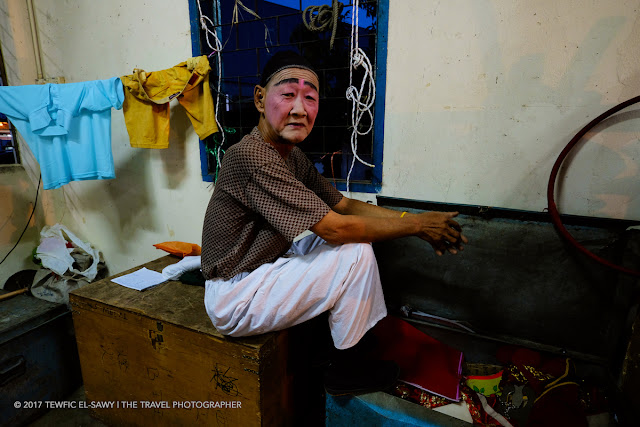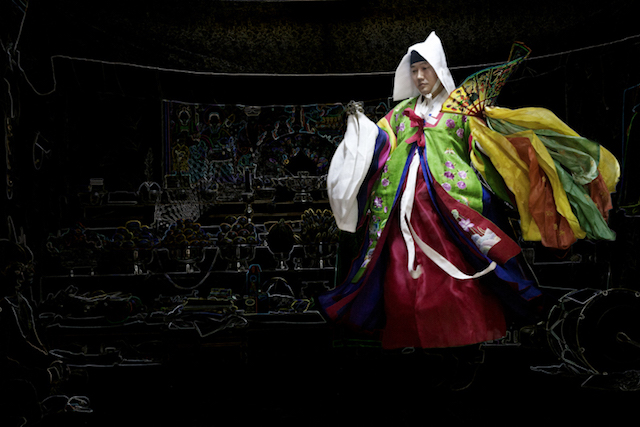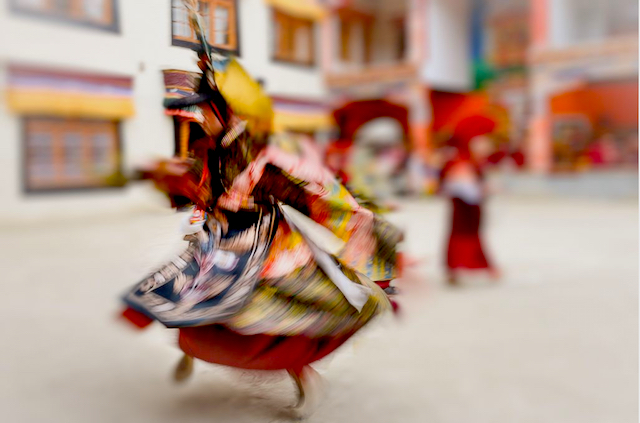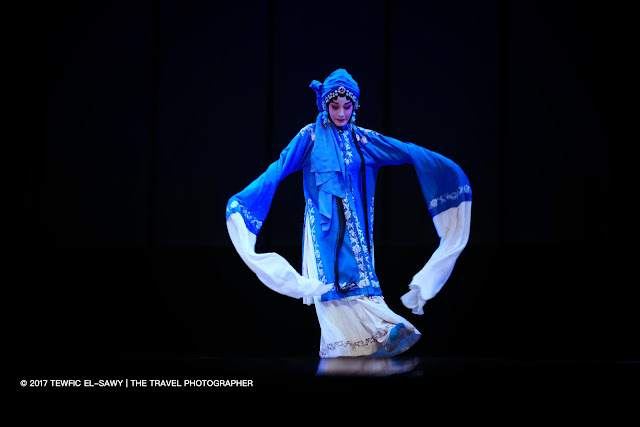My Best Images Of 2017...And Why | X-Pro 2 & GFX50s
 |
| Photo � Tewfic El-Sawy - All Rights Reserved X-Pro2/12mm Zeiss/f2.8 |
By "best", I mean that these images combine the visual (composition et al), the ambiance and its connection to me as photographer.
The first (not in any particular order) is one of many I took of "Wang"; an aging Hokkien opera performer in Ampang (Kuala Lumpur) during the Nine Emperor Gods festival in October. In fact, I have a complete blog post on Wang, and how I formed a bond of sorts when I dropped on a couple of nights by the stage where he and his troupe would perform. For me, "Wang" epitomizes the gradual decline in popularity of the Chinese Opera.
In this particular photograph, "Wang" wears heavy-handed make up on his face, with painted eyebrows. I can't decide whether his facial expression is sad, tired or is he being slightly sardonic. His face was very expressive, and I saw him use it during the shows. I deliberately used a wide angle (Zeiss Touit 12mm) to include the messy background, the drying clothes and the open trunk to show the "out-of-a-suitcase" lives of these itinerant opera troupes.
 |
Photo � Tewfic El-Sawy - All Rights Reserved X-Pro2/Fujinon 16-55mm/f3.2 |
Another favorite image is of four men in the small town of Qi Bao. It was taken in an ancient tea house where storytellers accompanied by Chinese pipas, perform their art. Qi Bao, a water town 18 kilometers from downtown Shanghai, was built in the Five Dynasties Period (907-979 AD), and it's in such tea houses that one can enjoy a traditional Suzhou pingtan performance of storytelling to music.
Shanghai in September was hot and sultry, and I thought these men were either retired or unemployed. They were totally unconcerned with the storytelling show a few yards away, and were doing their own thing. I thought it was a timeless image, despite the two men fiddling with their mobile phones...with the crooked handwritten posters on the walls, the rickety furniture, the tea cups and the ancient music, I recall feeling as if I had gone back in time....at least 40-50 years.
For more of my Shanghai street photography, see Incongruities in Monochrome gallery.
 |
Photo � Tewfic El-Sawy - All Rights Reserved X-Pro2/Fujinon 18mm/f2.0 |
Examining it later, I was about the chuck it out from my file of "possibles", but I liked the kimono's (and the bag's) design which contrasts with the plain gray/brown of the wall-fence...and the the striped t-shirts of the two little girls.
Many women of various nationalities (but mostly from East Asian countries) rent kimonos in Kyoto...and are appreciative when photographs are taken of them. The city officials developed programs to retain the traditional industries and artistry in making such garments, and to encourage people to wear them more often, so temples, museums, and restaurants in Kyoto offer discounts to women wearing kimonos.
Whilst in Kuala Lumpur in 2016 participating in the annual Travel Photographer Society event, I was introduced to The Old China Cafe; an old caf�-restaurant that serves a combination of Straits Chinese and Malay dishes, and whose untouched pre-war ambiance and large traditional feng shui mirrors gave me the idea of constructing a fantasy story about a beautiful Chinese woman dressed in a clinging red qi pao or cheongsam appearing to an habitual customer and opium-addled Western photographer.
This is one of my favorite photographs of a "mou sang" (hero) in a Cantonese opera held at the Chinese Community Center's theater on NYC's Mott Street. The performer is "Andrew" who is part owner of the Mandarin Court Restaurant just opposite the Center. His role is that of the mou sang (actor who can play both civil and martial roles)..and he was extremely adept in portraying the play's hero. I particularly liked his expression confronting his nemesis...and that his (inadvertent) reverse V-gesture is a vulgar one in Britain adds to his combativeness.
Fast forward to early May 2017, and I found myself once again at the Old China Cafe with Tracy Yee and Stanley Hong shooting for The Red Qi Pao, my fashion-themed story.
I had briefed Tracy as to the general idea of my imaginary story which was supposedly based in 1930 Shanghai, and she enthusiastically performed the role of the love-stricken Mei Li who was being ill-treated by her foreign lover.
The atmosphere of the Old China Cafe lent itself perfectly to the theme, and while photographing, I had flash-backs of the wonderful movie In The Mood For Love by Wong Kar-wai, starring Maggie Cheung and Tony Leung. For me, the photograph that best exemplifies the movie is the this one...of a pensive Mei-Li leaning against an old Chinese screen. I deliberately shot this frame so it would appear soft...to give it the mood I wanted to recreate in that particular sequence.
 |
Photo � Tewfic El-Sawy - All Rights Reserved X-Pro2/Fujinon 16-55mm/f2.8 |
In Tokyo...the metropolis of more than 9 million people has the reputation of having many lonely people. It is reported that instead of actually forging relationships, or continuing those they have already, Japanese people are hiring actors to play the roles of loved ones. Many young men have no courtship skills, and are unable to forge lasting relationships with young women as in the West.
At dusk near Shibuya station, this young woman waiting for someone...perhaps her boyfriend, her husband or other girlfriends, struck me as being forlorn and sad. She's clutching her mobile phone, perhaps expecting a call or message with a pensive expression. I saw her as vulnerable, cocooned in a outsized woolen sweater but wearing an unseasonable short dress.
Deep in her thoughts, she did not notice me...and every time I view this image, I wonder if her friend(s) showed up, or did she go home after a long wait....disappointed at her wasted evening.
For more of my Tokyo street photographs, see Tokyo Noir.
Since earlier this year, I've immersed myself in a new project involving Chinese Opera. While this project is continuously evolving and may now focus on this ancient performance art amongst the Chinese diaspora in South East Asia, I started it in New York City's Chinatown. This still-authentic area of lower Manhattan is home to Cantonese and Fujianese/Hokkien immigrants, and weekly shows are periodically performed.
This is one of my favorite photographs of a "mou sang" (hero) in a Cantonese opera held at the Chinese Community Center's theater on NYC's Mott Street. The performer is "Andrew" who is part owner of the Mandarin Court Restaurant just opposite the Center. His role is that of the mou sang (actor who can play both civil and martial roles)..and he was extremely adept in portraying the play's hero. I particularly liked his expression confronting his nemesis...and that his (inadvertent) reverse V-gesture is a vulgar one in Britain adds to his combativeness.
As I was standing about 20 feet from the stage, I used the X-Pro2 and the 18-135mm OIS lens to give me the range I needed.
For more of my photographs of Cantonese Opera, see this audio-slideshow.
 |
Photo � Tewfic El-Sawy - All Rights Reserved GFX50s/GF63mm/f2.8 |
Along with Eric, a photographer friend, we went to Guilin Park for the 3 hours photo shoot. The park's tea house provided an perfectly suitable backdrop for the photographs. I used my GFX50s along with its 63mm lens, as well as the X-Pro2 and a 16-55mm lens.
Ms Yiyi was very quick to understand what I sought, and had all the accessories needed to play the part; the opium pipe, the fake fur stole, the yellow fan and the high heels. While Eric was there to interpret whenever needed, I found it extremely easy to direct her as she intuitively knew what to do.
It was one of the most pleasant photo shoots I've had ever done. The tea house was empty at this time of day...perhaps because it was drizzling for most of the time, the park was not at all crowded, and the light was gorgeous. I shoot in ambient light, and I eschew strobes and reflectors.
Unfortunately Ms Yiyi wasn't able to view the resultant The Girl of Nanjing Road audio-slideshow as Vimeo and YouTube are banned (or censored) in China, but I did manage to send an abbreviated version of it via WeChat.
 |
Photo � Tewfic El-Sawy - All Rights Reserved X-Pro2/12mm Zeiss/f2.8 |
This is another monochrome "street" photograph made in a small eatery in Nakano, Japan. The elderly man was totally oblivious of my presence at the door of the eatery, and seemed to be lost in a world of his own. Similar to the Shibuya young woman in the previous photograph, he seemed to be lonely and vulnerable, and I felt sorry for him.
Naturally, these feelings are aroused in a matter of seconds, and he may have been quite the opposite...waiting for his wife and family to join him....but feeling sorry for him was my instinctive reaction.
I read somewhere this quote by a Japanese social researcher:
�An enormous flaw in Japanese society is that we don�t look each other in the eye when we�re walking in the streets. We need to re-think the Japanese fear of interacting with others.�
For more of my Tokyo street photographs, see Tokyo Noir.
 |
Photo � Tewfic El-Sawy - All Rights Reserved X-Pro2/Fujinon 18-135mm/f6.4 |
Another of my favorite frames of Chinese opera was in Shanghai. Qinqiang is a regional type of this performance art, and the show was at the Yi Fu Theater on Fuzhou Road. The opera's tale was about two women; both brides but with different fates. The opera's title is The Qilin Purse (a red purse bearing the symbol or image of the mythical Chinese 'unicorn', meant to bring luck and good fortune to brides at their weddings).
Quite different from Cantonese or Hokkien operas, Qinqiang is much more sophisticated. It originated in the Yellow River Valley of Shaanxi province in northwest China, and boasts the most ancient, affluent and largest musical system of all Chinese operas, and is reputed to be the forefather of Chinese operas. It's also listed as a national Intangible World Heritage since 2006.
The cast seemed to be very well known to the enthusiastic audience, and while I expected to be asked not to photograph the show, it was quite the contrary with a couple of other photographers setting up tripods in the aisles. I didn't need to as I used the 18-135mm OIS on my X-Pro2 which was perfect for the task.
Due to the lighting and my settings (1/90 sec, f5.6, 75mm, iso 1000 and spot metering), I was able to capture the performers against a dark background rendering it almost black, and seemingly floating on a mirror.
At the end of the performance, there was an encore...and many of the audience went to the front of the stage to take pictures with their mobile phones...I was looking for an opening amongst the crowd, and a man shoved others to make way for me. He brushed my objections to the side, saying because I was a foreigner I had priority!
 |
Photo � Tewfic El-Sawy - All Rights Reserved X-Pro2/Fujinon 16-55mm/f2.8 |
The tenth photograph (remember...they're not ranked by preference) is of a Hokkien opera performer applying his make-up before appearing on a stage in Sungai Way (Petaling Jaya). In contrast to the cluster of Malaysian photographers who were back stage that evening, I am not too fond of photographing the performers' reflections in mirrors. It's been done too many times, and have become trite....losing their impact because of overuse.
However, I made an exception for this one because I noticed the two reflections in the close-up mirror and the larger one....and because of the angle of view, I also noticed that the position of the performer's right hand with the brush (or applicator) looks different in the two mirrors. Perhaps an optical illusion?
If it wasn't for religious festivals, Chinese opera could well be virtually extinct in Malaysia. Before and during Chinese religious festivals such as the Hungry Ghosts festival and the Nine Emperor Gods festival, Chinese opera troupes live in the back areas of the stages that are specially erected, and perform nightly or even twice daily.
For this frame, I used the 16-55mm at a 24mm setting, iso 640 and center-weighted average.
For more of my Hokkien opera photographs, see Back Stage.





Comments
Post a Comment